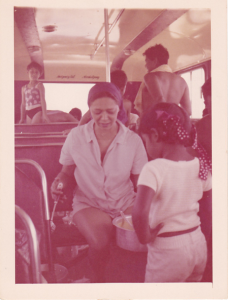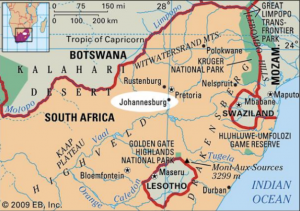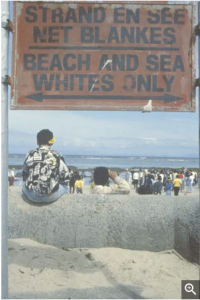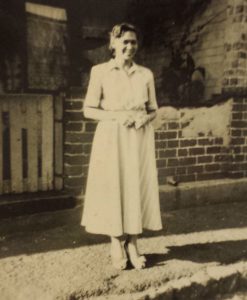
Juleigha (Julie) Patel, née Hassim, was born on June 20, 1930, in Johannesburg, South Africa. She was the middle child in a family of seven—four daughters and three sons. Although her family lived comfortably, they were subject to the harsh restrictions of apartheid. Her father, Osman (affectionately known as Opa), was a teacher with progressive values who encouraged all his children to be academically inclined and pursue post-secondary education. However, at the time, it was uncommon for women to attend university. Julie’s mother, Ghadija (known as Ouma), ensured her daughters were well-versed in domestic skills, teaching them how to cook, sew, knit, and practice various handicrafts. Among Julie’s siblings, one sister became a nurse, while her three brothers pursued professional careers—an economist, a lawyer, and a doctor.
Julie had a deep love for knitting, sewing, music, and reading. She was spirited and mischievous, often finding clever ways to avoid going to school. Her greatest passion was for sewing and knitting. In one memorable act of defiance, she climbed a mango tree in the family yard and refused to come down—all to skip school. Recognizing her determination, her wise father eventually relented. Julie left school and began working in a factory, sewing blouses and dresses—work she thoroughly enjoyed.
At the age of twenty, Julie became engaged to Ahmed (Chota) Patel, who at the time owned a small shop that served the local Indian community. Julie even sold some of her handmade garments in his store. Ahmed was enterprising and hardworking and soon made the bold decision to relocate the family to Durban to expand his business. During the early days of apartheid, such a move—from one province to another—was rare and challenging for people of colour.
Julie, who was very close to her family, was initially hesitant about the move. However, her pioneering spirit, resilience, and determination helped her navigate the transition and build a new life in Durban. Together, she and Ahmed raised their three children—Feisal, Ameen, and Fiona—instilling in them the same values of hard work, perseverance, and love of family.
Ahmed became an indent agent, serving as the sole representative for companies in Japan, Austria, and Scotland, selling specialty fabrics, household goods, and finely tailored garments. Julie played an integral role in the business, managing all administrative tasks. She taught herself how to type, file, place orders, and manage the finances. This work became her full-time occupation alongside raising a family.
An avid reader, Julie developed an impressive breadth of general knowledge, which enabled her to engage confidently and graciously when hosting Ahmed’s clients at home. In a time when women of colour rarely interacted with businessmen—and when Indians and Malays were forbidden from mixing with white South Africans in public spaces—Julie’s presence at the table was groundbreaking. She was, in many ways, a trailblazer for women’s rights and representation.
While the family lived modestly, they were comfortable in their life in Durban. However, over time, Ahmed became increasingly concerned about the limited opportunities available to their children under South Africa’s repressive political regime. In 1969, when Ameen was 13 and Feisal was 16, he took the two boys to Toronto, where they stayed with relatives who had previously immigrated to Canada. Two years later, Ahmed, Julie, and their daughter Fiona joined the boys in Toronto.
Julie was eager to work, but lacking Canadian experience, she remained at home to care for the family. Ahmed, once a successful entrepreneur, faced the challenge of starting over in a new country. He eventually found work as a major appliance salesman at Simpsons Department Store.
Life in Toronto was starkly different from their life in South Africa. The family lived in a small apartment in Scarborough, navigating a new culture and lifestyle. Finances were tight, but the home was always filled with music, laughter, and the aroma of Julie’s exceptional cooking. She had a gift for stretching every penny and creating magic in the kitchen. There were no vacations, no dinners out, and no family car. Instead, they traveled everywhere by public transit—a humble but hopeful beginning in their new homeland.
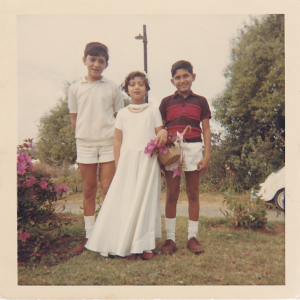
In 1973, just two years after arriving in Toronto, Ahmed died suddenly of a heart attack. His passing was a devastating blow to the Patel family and left Julie as the sole provider. Life, which had only just begun to stabilize, became much more difficult overnight.
To support her family and maintain the modest home they had purchased just months earlier, Julie took on multiple jobs. She sewed in the basement, babysat neighborhood children, and worked in various factories. A widow at just 43, in a foreign country without the support network she had back home, Julie wrestled with the idea of returning to South Africa. But she knew why they had come—to seek freedom and opportunity for their children. She chose to stay, not for herself, but for Feisal, Ameen, and Fiona.
Julie’s home was never one of sorrow or self-pity. She wasn’t a “woe is me” or “glass-half-full” person. She was, long before the slogan became famous, a “just do it” kind of woman. Her story echoes that of many immigrants, but her journey was uniquely difficult. Losing her husband so soon after immigrating made her resilience and accomplishments even more remarkable.
Her children were her world. But she didn’t just support them—she led by example. She modeled values of hard work, resourcefulness, resilience, fairness, humor, and joy. Julie showed her children that happiness wasn’t measured by money, and that life could still be full of light even during the hardest of times. She made what seemed impossible, possible ensuring all three of her children could pursue their dreams:
- Fiona earned a bachelor’s degree in history.
- Ameen became a medical doctor.
- Feisal completed two master’s degrees.
Once her children were secure in their futures, Julie turned her attention outward. She read voraciously on everything from English gardens to aircraft engines. She volunteered with Indigenous youth at a homeless shelter, knit bonnets, booties, sweaters, and blankets for newborns, and became a regular volunteer at the local food bank.
Julie loved to entertain at home. Her house became a cherished stop for friends and for her children’s friends. The kettle was always on, there was always a homemade sweet to share, and her table was rarely without a cup of tea, a cigarette, and good company.
In her later years, Julie often spoke of her dream to create a charity that would help students stay in school and relieve financial burdens. She never forgot the faces of the marginalized youth she met at the shelter. Her belief in the transformative power of education remained unshakable.
Today, her children—Feisal, Ameen, and Fiona—along with her grandchildren—Zarina, Adam, Camille, Alexandra, Andrew, and Matthew—are working together to make that dream a reality through the Julie Patel Foundation. Her legacy lives on in the lives they touch and the futures they help build.
